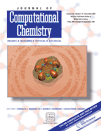Parallel DFT gradients using the Fourier Transform Coulomb method
Abstract
The recently described Fourier Transform Coulomb (FTC) algorithm for fast and accurate calculation of Density Functional Theory (DFT) gradients (Füsti-Molnar, J Chem Phys 2003, 119, 11080) has been parallelized. We present several calculations showing the speed and accuracy of our new parallel FTC gradient code, comparing its performance with our standard DFT code. For that part of the total derivative Coulomb potential that can be evaluated in plane wave space, the current parallel FTC gradient algorithm is up to 200 times faster in total than our classical all-integral algorithm, depending on the system size and basis set, with essentially no loss in accuracy. Proposed modifications should further improve the overall performance relative to the classical algorithm. © 2007 Wiley Periodicals, Inc. J Comput Chem, 2007




